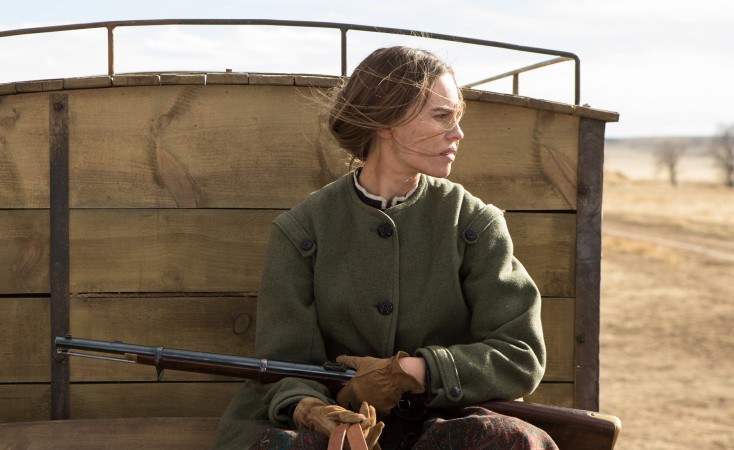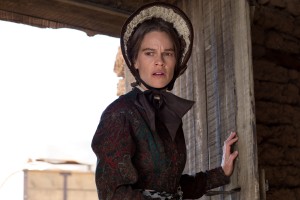By ANGELA DAWSON
Front Row Features
HOLLYWOOD—It’s been a few years since audiences have seen two-time Oscar winner Hilary Swank on the big screen. With the exception of the critically acclaimed TV movie “Mary and Martha,” the versatile and comely actress, who won her first Oscar for her portrayal of a transgender man who is maliciously murdered in “Boys Don’t Cry” and then a second Academy Award playing a boxer who suffers a serious injury in the ring in Clint Eastwood’s “Million Dollar Baby,” the actress has been virtually incognito. She was drawn back to the limelight by fellow thespian—and Oscar winner—Tommy Lee Jones to co-star with him in his big screen adaptation of Glendon Swarthout’s novel.
Swank, 40, plays a frontierswoman who takes it upon herself to transport three women regarded by the local community as mentally unstable across the Great Plains from Nebraska to Iowa via covered wagon. She enlists the help of a low-life drifter named George Briggs (Jones), promising him full payment for his services once they reach their destination 600 miles away.
As Mary Bee Cuddy, Swank plays a strong, independent-minded woman, whose only problem is she can’t find a man to marry her. Set in 1855, her station in life is considered low and expendable because she is unmarried, even though she has her own home and farm. As she and Briggs venture across the rough and unforgiving terrain with their “cargo,” they face dangers both physical and psychological.
Although she is a big Hollywood star, Swank maintains her homespun Midwestern charm. She addresses her co-star/director as “Mr. Jones” and she has brought along some family members to a press conference because they are in town for the film’s premiere.
A cold threatens to steal her voice, but the determined actress forges through the interview, occasionally popping lozenges in her mouth so she can keep talking.[private]
Q: How did Tommy Lee Jones talk you into starring in this film?
Swank: There was no “talking into it.” I read the script and I emailed Tommy Lee so then he sat down with me. He didn’t have to talk me into it. It would be nice if were like that all the time.
Q: How did you achieve the authenticity of the film?
Swank: I come from a generation of farmers. What’s interesting is my dad gave me accounts of our history. Our family goes back to the early 1700s in Iowa. There is one account that is so shockingly similar to this story, but I only read it three days ago, that my jaw dropped. My dad is here to see the premiere, but he still doesn’t know what the movie’s about. I thought, “Wow!” It is astounding. Indians shot one my ancestors 19 times but he was standing against a rock so he stayed upright. The Indians fled because they thought he was a spirit because he didn’t fall over.
Q: He was dead, right?
Swank: (joking) No, he was a spirit. He’s in the room right now.
Q: What emotional and physical toll did it take on you playing this character?
Swank: I would say the things that Mary Bee was working through are not dissimilar to the things we all work through in our lives. We all struggle how to be the best people we can be and try to find love along the way. That’s why it’s not just a period piece. It parallels everyday life for a lot of people.
I relish the opportunity that I get to play these slices of life. Even though it’s not based on a true story, in a lot of ways it’s real life stuff. Getting to do it alongside someone as esteemed as Tommy Lee, who’s been doing it for so long, is such an honor as an artist.
Q: Who is Mary Bee Cuddy to you?
Swank: She’s a woman with manners and morals and values. She wants to do the right thing just for the sake of doing the right thing. In my opinion, we have really lost touch with that as a society today. There are so many reasons why I love her and why I relate to her. As an independent woman myself and as a woman a lot of people for all intents and purposes people will call bossy, I have a real clear idea of how I see the world and how I want to live in the world. I want to see my dreams realized. I want to continue down my path. And so finding a man to walk shoulder-to-shoulder with me can be challenging. Women, today, have that challenge. So there are a lot of reasons why I love her and her vulnerability and strength.
Q: Talk about working with Tommy Lee as actor and also as a director?
Swank: He’s truly extraordinary. Tommy Lee comes alive in a different way when he’s in the element of doing what he loves. For me, it’s hard enough to figure out my character, and yet he has all these hats that he wore as co-writer, director and actor, and to be as together as he was is admirable.
Q: Was it easy to shake Mary Bee after your wrapped production?
Swank: I have to honestly tell you I didn’t want this to be over. I wanted it to go on. TV’s not medium for me because I like to play a character and then let it go and find the next character. I don’t know how would play a character year after year. But if this could have gone on into a TV series, I would have been very happy, because I really enjoyed it on every level as an artist and all the things I was able to sponge up from this veteran (actor) and being under his guidance. When you work with a director who also is an actor, there’s a shorthand. He knows how to say something in a few words to get the point across.
Q: How was Tommy Lee Jones a good director?
Swank: He learned not to give me a horse between takes because I’d leave. They had a horse wrangler but he became a Hilary wrangler.
Q: Did you know how to ride a horse before this film?
Swank: Not at all.
Q: But you learned to love riding them?
Swank: Yeah, I was like “Yee-haw!”
Q: Your character has a defining moment, did that change your opinion of her?
Swank: It made me realize just how truly human she was and how vulnerable she is. She goes where angels fear to tread. For all these valiant attributes of hers, there is still the underlying need for love. She’s human. To me, it made me realize I loved her even more, not because of the choice she made, but because it’s relatable—that kind of fear and what could happen to us type of aspect.
Q: The three women, played by Miranda Otto, Grace Gummer and Sonya Richter, which you and Tommy Lee’s character are transporting don’t say much in the film. Is it harder to act opposite performers that don’t say much?
Swank: Most of the time, you’re trying to figure out what’s happening between the lines because that’s the real reality of what’s going on.
Q: You get to sing in this one. Have you always wanted to sing in a film?
Swank: (laughing) No. That was a stunt, in my opinion.[/private]






